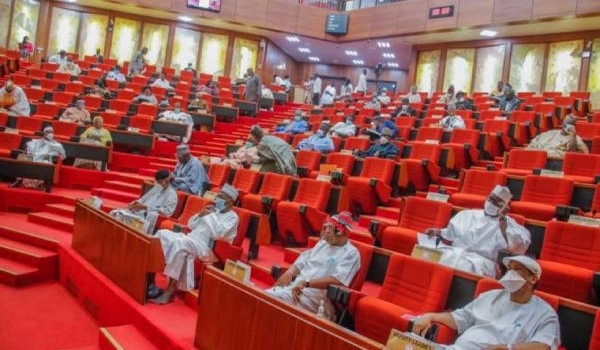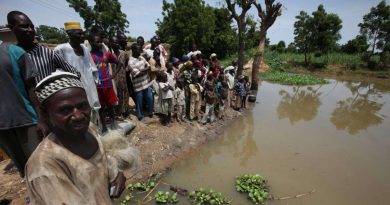New Senate bill allows States to generate, distribute Electricity as National Power Grid suffers sixth collapse in 2022
The Nigeria Senate on Wednesday passed a bill that would allow states to generate and distribute electricity.
The bill’s passage was sequel to the consideration of a report by the Committee on Power.
The Chairman of the Committee, Senator Gabriel Suswam (PDP, Benue North East), in his presentation, said the bill seeks to, amongst others, provide an Ideal legal and institutional framework to leverage the modest gains of the privatisation phase of the electric power sector in Nigeria.
He also said anyone or firm generating electricity below one megawatt does not need licence to do so.
He said, “The bill, when signed into law, will open up the space in the power industry and allows states or individuals with capacities to generate their own power and distribute.
“Since electricity is on the Concurrent List in the constitution, the bill has allowed state governments to license people who intend to operate mini-grid within the state.
“The bill also gives legal backing to renewable energy. If you decide to generate one megawatt of power using solar as an energy source, that is also provided for.
“That is the only way the power problem would be solved. The space is now open. There is little restriction as to who will generate power and distribute it.
“What is obtainable now is that any power generated must be put on the national grid for transmission and distribution.
“The bill also provides that any power generated below one megawatt does not require license to distribute.”
He added that when signed into law, the bill would improve utilisation of generated power through increased investments in new technologies to enhance transmission and distribution of generated power to minimise aggregate value chain losses.
According to the lawmaker, the piece of legislation would, “reinvigorate the Institutional framework for the reform of the Nigerian Electricity Supply Industry (NESI) initiated and implemented by the Federal Government.”
He disclosed that the provisions of the bill seek to promote policies and regulatory measures that would ensure the expansion of power transmission networks in Nigeria in order to address any imbalance in the existing transmission infrastructure.
Suswam noted that the bill would stimulate policy and regulatory measures to scale up efficient power generation, transmission, and distribution capabilities of the sector; as well as address technological limitations and outdated infrastructure that are responsible for value chain losses.
The Senate President midway through consideration of the bill sought to know the role and operational capacity of banks that had taken over distribution companies (discos) indebted to them.
Responding, Suswam explained that the take-over of entities (Discos) by banks was duly carried out in collaboration with the Nigerian Electricity Regulatory Commission (NERC) and the Bureau of Public Enterprise (BPE).
According to him, there was a transitional process put in place during the take-over of the Abuja Electricity Distribution Company (AEDC) by the United Bank for Africa (UBA) to ensure efficiency in service delivery.
He noted that such a transitional process usually involves the invitation of new investors to scale up generation and distribution capacities.
He further disclosed that the federal government had disbursed $100 million to Siemens to kick-start transmission in the distribution end of the power sector.
On his part, Senator Ahmad Babba-Kaita (PDP – Katsina North), said the faulty way in which Discos were created was largely responsible for their inability to live up to expectations.
He, therefore, advised the federal government to ensure a transparent process in the selection of companies to take-over power generation and distribution across the country.
The Senate President, Ahmad Lawan, in his remarks after the passage of the bill, said, “because of its importance and sensitivity, we would like to see a quick concurrence by the House of Representatives, because time is of the essence as far as Nigeria is concerned when you talk about electricity and energy supplies in Nigeria.
“So, we would like to see that this bill is fully processed in the National Assembly and sent to the Executive side of government for the consideration for assent by Mr. President.
“We believe that this piece of legislation can change the fortunes of the electricity industry in Nigeria for the better.”
Meanwhile, Nigeria’s national electricity grid on Wednesday suffered its sixth system collapse in 2022, throwing many homes and businesses across the country into total blackout.
The system failure occurred at about 11.27. am, according to industry sources, led to the crash of the entire power supply nationwide to 40 megawatts (MW)
Media report has it that allocations to the 10 electricity distribution companies (Discos) were zero, except 40MW and 10MW to Abuja and Ibadan Discos respectively, when the incident occurred.
The cause of the system collapse is yet to be ascertained.
However, the Transmission Company of Nigeria (TCN), which manages the national grid, has embarked on an investigation to ascertain the cause of the collapse.
Confirming the incident in a notice to its customers, Eko Electricity Distribution Company (EKEDC) said it was in talks with the TCN to ascertain the cause of the collapse and possible restoration timeline.
EKEDC stated, “Dear customers, we regret to inform you of a system collapse on the national grid at precisely 11:27a.m today, July 20.
“We are in talks with the Transmission Company of Nigeria to ascertain the cause of the collapse and a possible restoration timeline. We will keep you updated on the situation.”
The development threw many parts of the country, including the Federal Capital Territory (FCT,) into total darkness and had yet to be resolved as of yesterday evening.
Also, the Head, of Corporate Communications, Kaduna Electricity Distribution Company (KAEDC), Abdulazeez Abdullahi, announced the incident on behalf of the company in a statement published on its Facebook page.
“We regret to inform our customers that the power failure currently being experienced is as of the collapse of the national grid which occurred by 11:28 this morning.
“We hereby assure our esteemed customers of restoration of normal power supply as soon as TCN restores supply to us. We sincerely regret the inconveniences caused by the system failure,” he stated.
In the same vein, the Abuja Electricity Distribution Company (AEDC) in a statement noted: “Please be informed that the current power outage is due to a system failure from the national grid.
“The system collapsed at about 12:23 pm today, 20 July 2022, causing the outage currently being experienced. We appeal for your understanding as all stakeholders are working hard to restore normal supply,” it said.
The nation’s power sector has apparently defied all attempts made towards improving it even after the privatisation of the generation and distribution segments over eight years ago.
There has not been any marked improvement in the power supply situation in the country, if anything, it was a continuation of the darkness that has pervaded all homes and offices across the country for decades.




